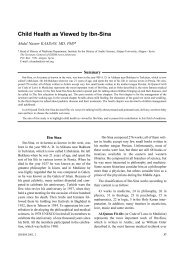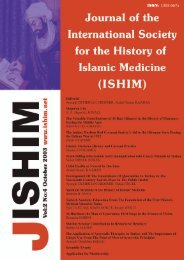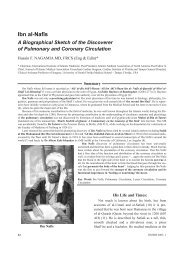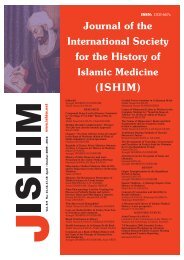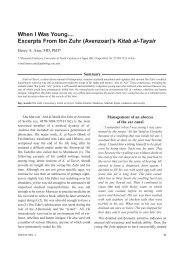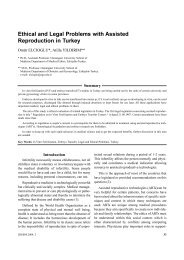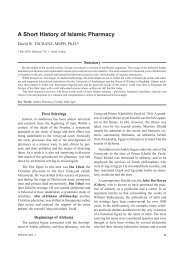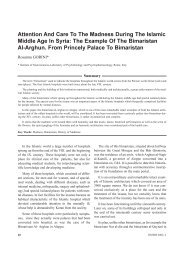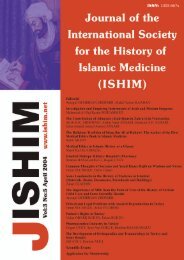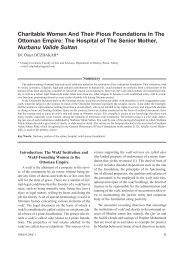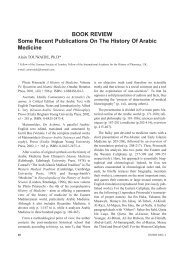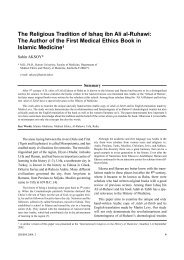Journal of - International Society for the History of Islamic Medicine
Journal of - International Society for the History of Islamic Medicine
Journal of - International Society for the History of Islamic Medicine
You also want an ePaper? Increase the reach of your titles
YUMPU automatically turns print PDFs into web optimized ePapers that Google loves.
‘Alī b. Sahl Rabbān al-Tabarī and His Works<br />
Salim AYDUZ<br />
complicated parts <strong>of</strong> <strong>the</strong> book came to be resolved by way<br />
his intellectual expertise, translators preceding him had<br />
failed to solve. He wrote a scholarly commentary on <strong>the</strong><br />
book, expounding some <strong>of</strong> <strong>the</strong> finer points that were not<br />
understood by previous translators.<br />
Sahl received <strong>the</strong> title <strong>of</strong> Rabbān because <strong>of</strong> his vast<br />
learning and knowledge <strong>of</strong> medicine and philosophy. Since<br />
<strong>the</strong> title “Rabbān (rabbi)” was given to <strong>the</strong> Jewish religious<br />
leaders, most <strong>of</strong> <strong>the</strong> historians thought that this family was<br />
a Jewish origin. Additionally, given <strong>the</strong> different writings <strong>of</strong><br />
<strong>the</strong> title, most <strong>of</strong> <strong>the</strong> people discommended about him. For<br />
instance, one <strong>of</strong> <strong>the</strong> oldest books <strong>of</strong> <strong>Islamic</strong> history, The <strong>History</strong><br />
<strong>of</strong> abarīٱ <strong>of</strong> al- abarīٱ 2 (d. 922), while giving his name<br />
and family names as Ali b. Rabbān al-Nasrānī, Mas’ūdī<br />
mentions him as “Ali b. Zayd”. For in Ibn al-Nadīm, he is<br />
called “Ali b. Sahl b. Rabbal” 3 , whilst Yāqūt writes about<br />
him as “Ali b. Zayn” 4 , and Ibn al-Qiftī as “Ali b. Rabbān” 5 .<br />
The erroneous knowledge about his Jewish origin most<br />
probably goes back to what Ibn al-Qiftī said about him. He<br />
wrote that “Rabbān, as a Jewish physician from Tabaristān,<br />
was very good on ma<strong>the</strong>matics, astronomy, and Jewish religious<br />
law and he translated <strong>the</strong> philosophical texts from<br />
one language to <strong>the</strong> o<strong>the</strong>r. His son Ali was a famous physician,<br />
who went to Iraq and settled down in Samarra. The<br />
words al-Rabbān, al-Rabin and al-Rāab are names given to<br />
those who are <strong>the</strong> eminent Jewish <strong>the</strong>ologians” 6 .<br />
On <strong>the</strong> o<strong>the</strong>r hand, Ali b. Rabbān very clearly described<br />
himself as a Christian in his book Kitāb al-Dīn wa al-Dawla.<br />
In Firdaws al-ٱikma, he also explains why his fa<strong>the</strong>r got<br />
<strong>the</strong> title Rabbān and <strong>the</strong> meaning <strong>of</strong> it: “My fa<strong>the</strong>r was one<br />
<strong>of</strong> scribes <strong>of</strong> Marw, noble, intelligent, kind, very good on<br />
<strong>the</strong> books <strong>of</strong> medicine and <strong>the</strong> philosophy. The medicine,<br />
as his family field has <strong>the</strong> priority. The aim <strong>of</strong> this was <strong>the</strong><br />
satisfaction spiritually and religiously, not <strong>the</strong> boasting and<br />
to get benefit from it. This is why he got <strong>the</strong> title Rabbān.<br />
The word Rabbān that implies “our leader, our senior person<br />
and our teacher” 7 . In his o<strong>the</strong>r book Al-Radd ‘alā al-Nā<br />
2 Ibn Jarīr al-Tabāri, Tārih al-umam wa al-muluk, ed. M. Abu al-Fadl Ibrahim,<br />
Dar al-Savaydan, Beirut, IX, 352.<br />
3 Ibn al-Nadīm, Kitāb al-Fihrist (completed 376/987), ed. Rizā Tajaddud,<br />
Tahran 1971, pp. 296, 354.<br />
4 Yāqût al-Hamawī, Mu’jam al-‘Udabā, ed. Ahmad Farid Rifai, Cairo,<br />
1936-38, VI, 429.<br />
5 Jamāl al-Dīn al-Qiftī (d. 1248), Tārīkh al-hukamā, ed. Julius Lippert,<br />
Leipzig, Dietrich, 1903, pp. 31, 167, 187.<br />
6 Zahīr al- Dīn ’Alī Baythaqī, Tārīkh hukamā al-Islām, Muhammad Kurd<br />
’Alī edition (Damascus, 1946), 22–23; D. Thomas, “al-ٱabarī,” in The<br />
Encyclopaedia <strong>of</strong> Islam, New Edition, Leiden: E. J. Brill, 2000, X, 17-18.<br />
7 Sami. K. Hamarneh, Health Sciences in Early Islam, ed. Munawar A.<br />
Anees, Texas: Zahra Publications, 1983, II, 353-358.<br />
ISHIM 2011-2012<br />
ārāٱ he says that he used to live as a Christian until his age<br />
was seventy when converted to Islam. In spite <strong>of</strong> <strong>the</strong> fact<br />
that some scholars mentions him as a Jewish physician who<br />
wrote in Arabic, and some <strong>of</strong> <strong>the</strong>m just a Jewish scholar,<br />
when his known treatises were published, all <strong>the</strong>se claims<br />
became academically invalid.<br />
One has to say that <strong>the</strong> dates given about his birthday<br />
and death in some modern studies are also erroneous. According<br />
to Brockelmann, <strong>for</strong> example, he was born in 192<br />
H (808 CE), and according to Meyerh<strong>of</strong> in 193 H (809 CE).<br />
In a statement given in his Firdaws al-ٱikma, it was understood<br />
that he was born earlier. In this statement, he says that<br />
“when I was praying maghrib with my dad, I saw a huge fire<br />
in <strong>the</strong> sky as a column shape. Just after this event, <strong>the</strong> ruler<br />
got into trouble and lost some <strong>of</strong> his territories”. Sources<br />
such as Ibn Al-Athīr and Ibn Kathīr say that this event occurred<br />
during <strong>the</strong> reign <strong>of</strong> Caliph Mahdī and that <strong>the</strong> relevant<br />
event occurred in 167 H (783-84 CE) to <strong>the</strong> ruler <strong>of</strong><br />
Tabaristān Wandad Khurmuz. Evidently, Ali b. Rabbān was<br />
<strong>of</strong> a certain age so that he can remember <strong>the</strong> event. There<strong>for</strong>e,<br />
most probably he was born around 778-9 CE.<br />
‘Alī b. Sahl Rabbān received his preliminary education<br />
from his fa<strong>the</strong>r Sahl in medical and natural sciences, calligraphy,<br />
ma<strong>the</strong>matics, philosophy and literature. Besides<br />
giving him a good education, his fa<strong>the</strong>r taught him religion<br />
and philosophy. As one can understand through his works,<br />
apart from Arabic, Persian and Syriac, he had also mastered<br />
Hebrew and Greek languages to a high degree <strong>of</strong> pr<strong>of</strong>iciency.<br />
For example, he translated his own book written in Arabic<br />
Firdaws al-ٱikma into Syriac language.<br />
When he was ten years old, he was taken to Tabaristān<br />
(hence<strong>for</strong>th al-ٱabarī) by his fa<strong>the</strong>r and he spent his early<br />
youth in Tabaristān. The intellectual and pleasant atmosphere<br />
which enabled him to devote his time to <strong>the</strong> study<br />
<strong>of</strong> a range <strong>of</strong> subjects including philosophy, medicine and<br />
religious, as well as various aspects <strong>of</strong> natural sciences<br />
After he completed his education in Tabaristān, he<br />
moved to Iraq in 813 when he was thirty years old. Since<br />
ٱ-al his residence in Tabaristān, he became known as<br />
abarī. When Māzyār b. Qārin appointed as a governor <strong>of</strong><br />
Tabaristān in 825, he back to Tabaristān and went Māzyār’s<br />
service as a scriber. During this time, he started to compose<br />
his Firdaws al-ٱikma <strong>the</strong>re but he finalised in Samarra in<br />
850.<br />
His patron Māzyār revolted against <strong>the</strong> ruler in 839,<br />
but he was captured and executed. Upon <strong>the</strong> Māzyār’s unsuccessful<br />
revolt against <strong>the</strong> caliph and execution, he went<br />
to Rayy and back to his own job as a physician. But after<br />
a while, he went again Iraq and settled down in Samarra.<br />
3



